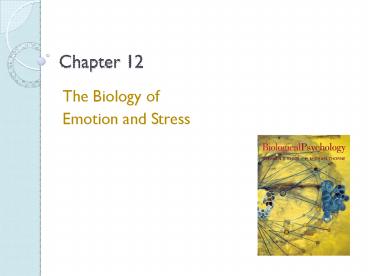The Biology of - PowerPoint PPT Presentation
Title:
The Biology of
Description:
Chapter 12 The Biology of Emotion and Stress Stress Stressor - An event that either strains or overwhelms the ability of an organism to adjust to the environment. – PowerPoint PPT presentation
Number of Views:117
Avg rating:3.0/5.0
Title: The Biology of
1
Chapter 12
- The Biology of
- Emotion and Stress
2
Stress
- Stressor - An event that either strains or
overwhelms the ability of an organism to adjust
to the environment.
3
Types of Stressors
Physiological stressors include extreme cold or
heat, the invasion of dangerous microorganisms,
and physical injury. Psychological stressors
include the death of a relative or friend, an
upcoming exam, and being fired from a job.
Ben Fogle 2012
4
Stress
- Pressure - An expectation to behave in a specific
way within a particular time frame. - Conflict - The inability to satisfy two or more
incompatible motives. - Frustration - The obstruction of achieving a
goal. - Stress response - The psychological and
physiological changes that occur when we
encounter a stressor determines whether we are
able to adapt to the stressful experience.
5
Biological Reactions to Stressors
- General Adaptation Syndrome (GAS) - A pattern
of physiological responses to a physiological or
psychological stressor all stressors produce
this response. - The GAS has three stages
- Alarm stage
- Resistance stage
- Exhaustion stage
Han Selye
6
The Alarm Stage
- Characterized by intense sympathetic nervous
system arousal also called alarm reaction. - Emergency reaction mobilizes our resources and
prepares us for fight or flight, enabling us to
cope behaviorally with stressful experiences. - Alarm reaction lasts for a relatively short time.
- When the stressor ends, the parasympathetic
nervous system takes over, restoring our
physiological reserves to pre-stressor levels. - If the stressor continues, however, we enter the
second stage of the GAS.
7
The Resistance Stage
- Characterized by the mobilization of
physiological resources to cope with a prolonged
stressor. - All physiological systems not directly involved
in stress resistance are inhibited in this stage. - A prolonged stressor continues the hypothalamic
activation causing an increased release of
adrenocorticotropic hormone (ACTH) from the
anterior pituitary gland.
8
The Resistance Stage
- ACTH released into the bloodstream continues to
stimulate the manufacture and release of
glucocorticoid hormones (which provides continued
energy supply) from the adrenal cortex. - This sequence of structures, the hypothalamus,
pituitary gland, and adrenal cortex, is part of
the stress axis.
9
The Exhaustion Stage
- If the stressor continues indefinitely, an animal
eventually depletes its physiological resources,
resulting in failure of the bodys defense
systems and eventually death. - Overtraining syndrome - disorder caused by
excessive training by athletes characterized by
decreased performance, chronic fatigue, mood
changes, and evidence of a compromised immune
system.
10
The Three Stages of the GeneralAdaptationSyndrom
e
11
Diseases of adaptation
- An illness caused by the efforts of the body to
cope with stressors. - Essential hypertension
- Gastric or peptic ulcers
- Colitis
- Stress reactions can both cause these illnesses
and intensify their severity.
12
Stress and Neuroplasticity
- Chronic stress suppresses cellular proliferation
and leads to a shortening and loss of dendrites
in the hippocampus. - By preventing the cellular changes that accompany
learning and memory, stressors can have a
profound effect on the ability to learn and
remember. - Not all stress has negative consequences
- Acute stress enhances both the immune system and
the memory of potentially threatening events.
13
Coping With Stressors
- Distress - Negative stress
- Eustress - Positive stress with
- beneficial effects
- Different people respond differently to the same
stressor. Some people have an intense alarm
reaction to a stressor that causes only a low or
moderate reaction in other people. - These responsivity differences influence disease
development
14
Coping Behaviors Type A, Type B
- Type A - A set of behaviors that includes an
excessive competitive drive, an intense sense of
time urgency, and high aggressiveness. - Type B - A set of behaviors that are relatively
relaxed, patient, and easy-going. - Type As are twice as likely to have a heart
attack as type Bs - Type A is an independent risk factor for
developing coronary heart - disease.
15
Why Are Type As More at Risk for Coronary
Disease?
- Significantly more reactive to stressors.
- Have greater norepinephrine release which can
accelerate arterial damage, enhance blood clot
formation, and produce cardiac arrhythmias. - Smoke more, sleep less, drink more caffeine
- Show more hostility and are
- quick-tempered anger, which appear
- to be independent risk factors for
- coronary heart disease.
16
Hardiness
- Is the ability to cope effectively with stressors
because of - - a high level of commitment
- a perception that change is a challenge rather
than a threat - a sense of control over events.
May explain why some individuals thrive despite
being raised in extremely dysfunctional
circumstances, while others fail in the most
advantageous environments.
17
Hardiness
- Hardy people are less biologically responsive to
stressors cope better under stress - Hardy people have a greater sense of purpose, a
stronger commitment to self, an internal locus of
control, and experience less emotional stress. - Hardiness has been shown to
- be inversely related to
- depression and fatigue.































